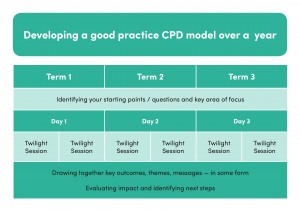Initiatives and Projects
Working together in groups as a 'community of learners' is a highly effective way to develop thinking and professional learning. The ‘community’ becomes a forum for developing ideas, sharing good practice and raising the quality of learning and teaching.
Initiatives and Projects are led and mentored by Di, who will co-ordinate, support, document, deliver training and act as a critical friend to support changes to practice over a period of time.
Communities of practice are groups of people who share a concern or a passion for something they do and learn how to do it better as they interact regularly’
Wenger 2006
Wenger 2006
A community of learners with a common commitment to reflective, critical practice and professional development Siraj – Blatchford et al 2006
Siraj – Blatchford et al 2006
Working collaboratively on an identified focus, project or initiative means that the whole team or cluster can:
- → work together
- → think together
- → reflect together
- → develop together
- → understand together
- → create together
- → learn together
Di’s model of Extended Professional Development

The Extended Professional Development Initiative (EPDI) model outlines how partners can work together on an identified focus, initiative or project over the longer term (3 mths, 6 mths, 12 mths or longer) which will have a significant impact on the quality of practice and provision.
Projects and Initiatives start from where you are and usually include a self-evaluation so that you can identify what you need to do to develop good practice;
Initiatives Include;
- Talk for Reading
- Talk for Maths Mastery
- Sustained Shared Thinking
- How young children Learn - The Characteristics
- Child-initiated play and learning - Balancing Play
- Assessment for Learning; Mapping children's progress
- Leading the Learning; an observational approach
- Peer to Peer support
Cost:
The cost depends on the initiative and size of the cluster, how long the period of support is and how many partners are involved. It is a great way of sharing costs between clustered groups
‘Terms’ are defined by Autumn, Spring and Summer but projects can begin at any point you decide upon.
Please contact us to discuss your requirements


